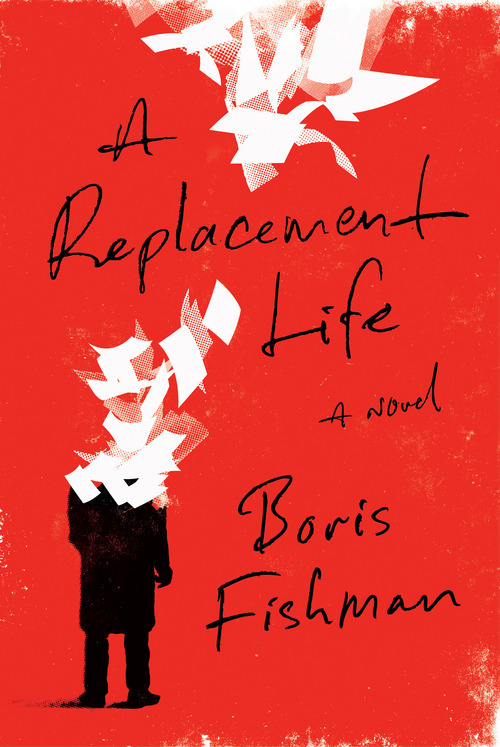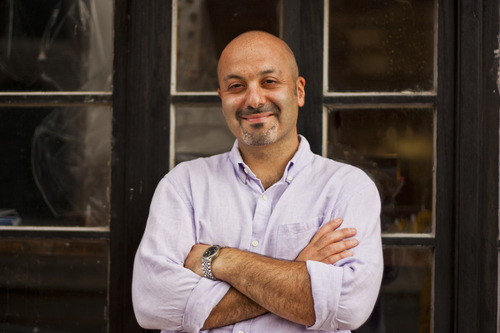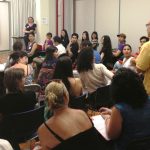Meet a NYFA Artist: Boris Fishman
NYFA TALKS TO BORIS FISHMAN (AFP ‘11 NONFICTION)
The writer discusses working at his scuffed wooden desk, his previous job as a fact-checker, and his first novel, A Replacement Life.
NYFA: Congratulations on the publication of your first novel, A Replacement Life, how long did it take you to complete?
BF: Depending on how you count, three years and change at the shortest, nearly twenty at the longest. In the 1990s, though I was only a teenager, my (real-life) grandmother’s Holocaust-restitution paperwork – she was a survivor of the Minsk ghetto – was given to me because I had the best English in the family. (We immigrated from the former Soviet Union in 1988.) I was struck by the application’s low burden of proof – if you could tell a persuasive story, you were in, so to speak. That got me thinking. But it wasn’t till 2005 that I wrote a short story around this, and not till the fall of 2009 that I started writing the novel, which sold to HarperCollins in January 2013.
NYFA: How did you come up with the title, A Replacement Life?
BF: I had it from the beginning, and resisted a suggestion to alter it by an editor abroad. To me, so many things about the story have to do with the ambivalence of replacing and being replaced. The Gelmans replace the Soviet Union with America; Slava replaces his forefathers; Slava’s inventions replace the grandmother he never got to know in real life; the false narratives replace the truth about what these people went through; and Slava, too, will be replaced, by his descendants. This list goes on and on.
NYFA: Your novel unmistakably touches on the 2010 scandal of the defrauded Holocaust Fund, can you talk about the experience, and perhaps, complications, that came with writing a fictitious account of real-life events?
BF: Actually, I had written a complete first draft of the novel by the time this was exposed. It was a doleful vindication, to be sure – life imitating art in the most depressing way. I wrote an essay in Tablet Magazine, an online magazine of Jewish life and culture – arguing that, legally, there was no question – the people responsible should go to prison. But morally, it was a more complex issue – I argued that it was worth understanding why these people had behaved this way, and it wasn’t (I informed my audience) because they were evil. I was eviscerated in the comments, which was very depressing. Readers didn’t seem particularly interested in a complex portrait of these villains. I’ve been gratified to have a much more nuanced response to the novel. I haven’t heard much objection on principle to the humanization of criminals.
NYFA: Similar to the main character, Slava Gelman, you and your family immigrated to the United States from the former Soviet Union, how did your experience inspire the development of that character?
BF: I am not Slava literally. I didn’t run away from my family; I didn’t have the romantic choices that he faces; and so on. But spiritually, the questions he grapples with are very much the ones I faced in my 20s. How do you honor your elders if their definition of honor is different? How to reconcile their vision of you with your own? How do you acquire comfort in your own skin? How do you maintain dignity and faith when the world is saying No over and over?

NYFA: When and where do you like write? Do you have a routine?
BF: Absolutely. I wake up by 8 or so, and try to be reading, coffee in hand, by 8:30. I try to for 1-2 hours, or 50 pages of the book I’m reading, whichever comes first. I know some don’t like to read others while they’re writing, but it gets me going; it hops me up on the possibilities of what good writing can do. By 10 or so, I’m writing. If I’m writing, I go for 3-4 hours. If I’m revising, for 4-5. By the end of this, I feel as depleted as if I’ve been crushing concrete; I’m starving (I don’t allow myself to get up from the work-chair except to go to the bathroom or have a quick bite); and my brain is like a wrung-out towel. But until I got my contract from Harper, this was the moment when I would have to begin my second shift, of whatever was actually paying the bills (fact-checking, journalism, editing, etc.)
I work at a huge, scuffed wooden desk with iron supports that I got from Housing Works – the first thing I got for my apartment. (A decorating novice, I had neglected to measure the width of my door; it had to come off its hinges to accommodate the desk). I live on the 15th floor of a high-rise two lights away from the FDR and the East River. I stare at clouds and water, and listen to bridge traffic and children screaming in the recess field of the school directly outside my building. I’ve decorated my apartment in a Mexican style – rust-orange in the living room, crimson in the kitchen. For some reason, none of it feels heavy – it’s always been an oasis, incredibly fertile for work. If you’re curious to read a profile of the apartment.
NYFA: You have held multiple jobs to support your writing career. Did any of these jobs influence your writing?
BF: There’s a great debate out there about whether the second job should be related to writing (so it teaches you something useful for the main work) or unrelated (so it leaves your writing brain undrained). I’m not sure what the answer is. My first job, as a fact-checker at The New Yorker, was invaluable as a kind of graduate school in journalism. I learned about concision, elegance, observation. I learned how a story is put together. On the other hand, I learned a lot of instincts, such as analysis, that I had to unlearn for the novel. Crudely speaking, nonfiction analyzes and fiction renders. Perhaps one of the reasons A Replacement Life needed so many drafts is that I had to unlearn the tendency to explain everything happening on the page.
NYFA: You are finishing up your second novel, Don’t Let My Baby Do Rodeo, can you share any information on what it is about?
BF: More than finishing! It’s finished and HarperCollins just bought it for early 2016 release, about which I’m thrilled. DoLeMyBaDoRo, as I’ve taken to calling it, is about a Russian-American couple in New Jersey that adopts a boy from Montana who turns out to be wild. They have to figure out how to make a life with this foreigner; meanwhile, they are such foreigners themselves. If the novel had a tagline the way movies do, it would be: “A novel about the truest wilderness of them all — the one in our hearts.”
NYFA: You were awarded a NYFA Fellowship in Nonfiction in 2011, how did NYFA’s support impact your career?
BF: It’s not possible to quantify the succor provided by a grant like the one I got from NYFA. Financial, emotional, psychological – all of it. I’ve never quite gotten used to how little the government in this country helps its artists. There are certain qualities in America, such as its strenuous tolerance, that, for someone like me, born in a highly xenophobic country, feel miraculous; but then the suspicion of art, and its conception as some kind of unreachable elitism, that feels equally prevalent in America, are so upsetting and hard to swallow. In any case, organizations like NYFA give you not only the means to live, but give you to feel that what you are doing has meaning in this world. And, arguably, that’s worth just as much. And one more thing: The community-arts-organization project that NYFA asks grant recipients to do was so incredibly rewarding in my case. I taught a writing workshop in the Lake George area. The class had maybe a dozen students; I am still in touch – friends with, probably, by this point – with about half.
For more information about Boris, please visit his website.





